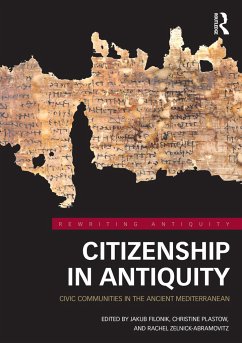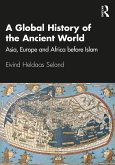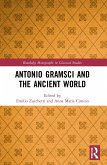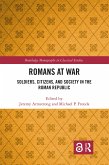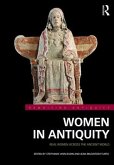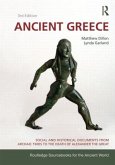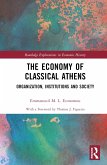Citizenship in Antiquity brings together scholars working on the multifaceted and changing dimensions of citizenship in the ancient Mediterranean, from the second millennium BCE to the first millennium CE, adopting a multidisciplinary and comparative perspective.
The chapters in this volume cover numerous periods and regions - from the Ancient Near East, through the Greek and Hellenistic worlds and pre-Roman North Africa, to the Roman Empire and its continuations, and with excursuses to modernity. The contributors to this book adopt various contemporary theories, demonstrating the manifold meanings and ways of defining the concept and practices of citizenship and belonging in ancient societies and, in turn, of non-citizenship and non-belonging. Whether citizenship was defined by territorial belonging or blood descent, by privileged or exclusive access to resources or participation in communal decision-making, or by a sense of group belonging, such identifications were also open to discursive redefinitions and manipulation. Citizenship and belonging, as well as non-citizenship and non-belonging, had many shades and degrees; citizenship could be bought or faked, or even removed. By casting light on different areas of the Mediterranean over the course of antiquity, the volume seeks to explore this multi-layered notion of citizenship and contribute to an ongoing and relevant discourse.
Citizenship in Antiquity offers a wide-ranging, comprehensive collection suitable for students and scholars of citizenship, politics, and society in the ancient Mediterranean world, as well as those working on citizenship throughout history interested in taking a comparative approach.
Chapters: Chapters 47 and 48 of this book arefreely available as a downloadable Open Access PDF at http://www.taylorfrancis.com under a Creative Commons Attribution-Non Commercial-No Derivatives (CC-BY-NC-ND) 4.0 license.
The chapters in this volume cover numerous periods and regions - from the Ancient Near East, through the Greek and Hellenistic worlds and pre-Roman North Africa, to the Roman Empire and its continuations, and with excursuses to modernity. The contributors to this book adopt various contemporary theories, demonstrating the manifold meanings and ways of defining the concept and practices of citizenship and belonging in ancient societies and, in turn, of non-citizenship and non-belonging. Whether citizenship was defined by territorial belonging or blood descent, by privileged or exclusive access to resources or participation in communal decision-making, or by a sense of group belonging, such identifications were also open to discursive redefinitions and manipulation. Citizenship and belonging, as well as non-citizenship and non-belonging, had many shades and degrees; citizenship could be bought or faked, or even removed. By casting light on different areas of the Mediterranean over the course of antiquity, the volume seeks to explore this multi-layered notion of citizenship and contribute to an ongoing and relevant discourse.
Citizenship in Antiquity offers a wide-ranging, comprehensive collection suitable for students and scholars of citizenship, politics, and society in the ancient Mediterranean world, as well as those working on citizenship throughout history interested in taking a comparative approach.
Chapters: Chapters 47 and 48 of this book arefreely available as a downloadable Open Access PDF at http://www.taylorfrancis.com under a Creative Commons Attribution-Non Commercial-No Derivatives (CC-BY-NC-ND) 4.0 license.
"This book is a welcome and monumental contribution (including 49 chapters) to the origins of civic communities, their political expression through organised bodies of citizens and their capacity to build counter-powers that limit royal agency in some way. From this perspective, this excellent volume addresses fundamental issues about organising ancient societies through the lens of citizenship. It summarises research developed in diverse fields of scholarship, sometimes in regions far away from what is usually regarded as the cradle of civic life and citizen identity - the Greek polis and the Roman Republic - and in different periods, from the Iron Age to the Early Middle Ages." - The Classical Review
"...this volume adds a strong voice to the on-going discussions and re-analyses of civic space and the usefulness of the concept of "citizenship" in the ancient world...[it] will likely become a standard reference text for those interested in multifaceted takes on important themes, including citizenship, civic belonging, and the interconnections between civic and religious practice in the ancient world." - Bryn Mawr Classical Review
"Jakub Filonik, Christine Plastow, and Rachel Zelnick-Abramovitz have edited a truly game-changing volume on citizenship in antiquity... Attention to historical change and transformation of citizenship practices comes out particularly strongly. Another major strength of the volume is attention to both institutionalist perspectives on citizenship and performative approaches (e.g. citizenship and religion) and attention to the impact of wider processes, such as imperial expansion." - Greece and Rome
"...this volume adds a strong voice to the on-going discussions and re-analyses of civic space and the usefulness of the concept of "citizenship" in the ancient world...[it] will likely become a standard reference text for those interested in multifaceted takes on important themes, including citizenship, civic belonging, and the interconnections between civic and religious practice in the ancient world." - Bryn Mawr Classical Review
"Jakub Filonik, Christine Plastow, and Rachel Zelnick-Abramovitz have edited a truly game-changing volume on citizenship in antiquity... Attention to historical change and transformation of citizenship practices comes out particularly strongly. Another major strength of the volume is attention to both institutionalist perspectives on citizenship and performative approaches (e.g. citizenship and religion) and attention to the impact of wider processes, such as imperial expansion." - Greece and Rome

